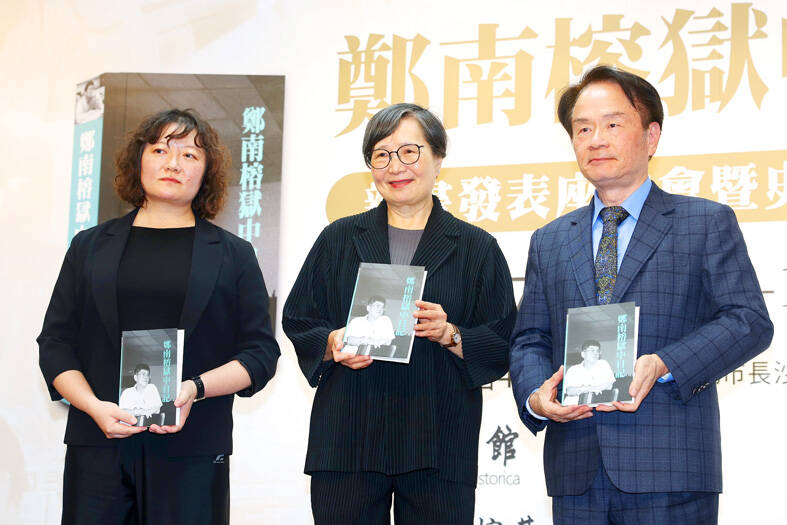Academia Historica, Taiwan’s national institute for historical research, marked the 36th anniversary of freedom of speech advocate Deng Nan-jung’s (鄭南榕) death this year with the publication of the diary he kept during his incarceration and the induction of a large consignment of historical documents on his life.
In the fall of last year, the Nylon Cheng Liberty Foundation expressed its intent to donate “a large number of historical documents” to Academia Historica, Academia Historica president Chen Yi-shen (陳儀深) said, adding that as of April 7, it has archived 1,042 documents and 27 photos.
Those include Deng’s manuscripts, newspaper cutouts on major political movements he spearheaded, court documents on him, company registration documents of his magazine, Freedom Era Weekly, as well as obituaries and news reports on his death, Chen said.

Photo: CNA
Some of the documents are shown in the diary, shedding new light on Taiwan’s authoritarian era.
Deng was detained and denied bail from June 2, 1986 to Jan. 24, 1987, charged with contravening Taiwan’s election and recall of civil servants law due to an article he published in his magazine.
However, Ministry of Foreign Affairs files included in the appendix of Deng’s diary showed that his detention, which took place during the Martial Law era, could have an ulterior motive, Chen said.
During Deng’s detention, many foreign media outlets focused on Taiwan’s civil society-led political movement linked his arrest to his engagement in political activities, believing it to be politically motivated, Chen said.
The appendix includes a “clarification of distorted reporting,” which the Cabinet’s news office sent to the Ministry of Foreign Affairs on June 6, 1986, shortly after his detention in response to reports by Chinese-language newspapers in the US that said the arrest was “unprocedural.”
An analysis of the reports by various foreign news agencies showed that Deng’s detention could be “political persecution.”
Chen said that as he sees it, the then-Chinese Nationalist Party (KMT) administration likely wanted to frame the arrest of Deng, as well as other political activists, as nonpolitical to make them appear less crude.
The diary also offers rare insights into his time in prison, including his relationships with gang bosses incarcerated with him at the Taipei Detention Center, and his musings on freedom of speech and the importance of Taiwan’s self-determination.
Cheng Chu-mei (鄭竹梅), Deng’s daughter, who heads the foundation, said although it was hard to let go of the documents the family had safeguarded for 36 years, she saw it as a “necessary next step” so the public has access to more comprehensive data on Deng and reflect upon his era, as Taiwan works toward becoming a “normal” country.
Deng, who founded the Freedom Era Weekly magazine in 1984 under martial law, was a pro-democracy activist and self-declared supporter of Taiwanese independence.
He often gave public speeches in the 1980s advocating for Taiwan’s independence and demanding that an investigation be launched into the 228 Incident in 1947, a brutal crackdown by the then-KMT regime on protesters, to facilitate reconciliation between ethnic groups in Taiwan.
On April 7, 1989, Deng, charged with sedition for publishing a “Draft Constitution of the Taiwan Republic” in his magazine, had been in self-confinement in his office for 71 days, when armed police had surrounded Freedom Era Weekly’s headquarters in Taipei, ready to raid the building.
Bent on defending his total freedom of speech, he self-immolated.
He was 41.

Three batches of banana sauce imported from the Philippines were intercepted at the border after they were found to contain the banned industrial dye Orange G, the Food and Drug Administration (FDA) said yesterday. From today through Sept. 2 next year, all seasoning sauces from the Philippines are to be subject to the FDA’s strictest border inspection, meaning 100 percent testing for illegal dyes before entry is allowed, it said in a statement. Orange G is an industrial coloring agent that is not permitted for food use in Taiwan or internationally, said Cheng Wei-chih (鄭維智), head of the FDA’s Northern Center for

The Chinese military has built landing bridge ships designed to expand its amphibious options for a potential assault on Taiwan, but their combat effectiveness is limited due to their high vulnerability, a defense expert said in an analysis published on Monday. Shen Ming-shih (沈明室), a research fellow at the Institute for National Defense and Security Research, said that the deployment of such vessels as part of the Chinese People’s Liberation Army (PLA) Navy’s East Sea Fleet signals a strong focus on Taiwan. However, the ships are highly vulnerable to precision strikes, which means they could be destroyed before they achieve their intended

LOOKING NORTH: The base would enhance the military’s awareness of activities in the Bashi Channel, which China Coast Guard ships have been frequenting, an expert said The Philippine Navy on Thursday last week inaugurated a forward operating base in the country’s northern most province of Batanes, which at 185km from Taiwan would be strategically important in a military conflict in the Taiwan Strait. The Philippine Daily Inquirer quoted Northern Luzon Command Commander Lieutenant General Fernyl Buca as saying that the base in Mahatao would bolster the country’s northern defenses and response capabilities. The base is also a response to the “irregular presence this month of armed” of China Coast Guard vessels frequenting the Bashi Channel in the Luzon Strait just south of Taiwan, the paper reported, citing a

About 4.2 million tourist arrivals were recorded in the first half of this year, a 10 percent increase from the same period last year, the Tourism Administration said yesterday. The growth continues to be consistent, with the fourth quarter of this year expected to be the peak in Taiwan, the agency said, adding that it plans to promote Taiwan overseas via partnerships and major events. From January to June, 9.14 million international departures were recorded from Taiwan, an 11 percent increase from the same period last year, with 3.3 million headed for Japan, 1.52 million for China and 832,962 to South Korea,